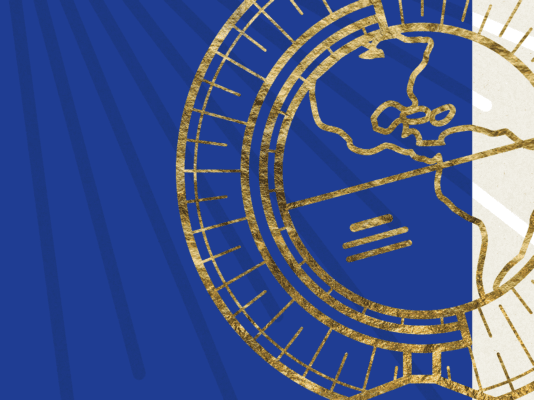One of my favorite email newsletters I read is from The Economist. It has become a go-to resource for world news. Each morning, they send a rundown called the Espresso. It highlights stories from other countries that many U.S.-based news outlets rarely mention or go in depth about because of their focus on domestic affairs. Routinely, I read about social trends affecting populations around the world or the various ways that authoritarian regimes are suppressing basic human rights through technology.
Being exposed to all these events has helped me see the vastness and gravity of world affairs, to break out of the isolation of American news, and more importantly, to understand the plight of so many people internationally who are created in the very image of God. This simple newsletter has expanded how I see the dignity of all people, no matter where they live or what they believe. It has allowed me to have a broader global mindset in my prayers and work as I think about the thousands of missionaries who are sharing the gospel, often in hostile places.
But this same practice of news consumption also tends to bring with it unintended consequences that display the incredible power of technology to shape humanity. In our digital age, it is difficult to think wisely about technology given how it forms us—often unconsciously—for good and ill. Media theorist and cultural critic Neil Postman describes technology as having these complex and profound effects on every aspect of our life at its core. He explains that “once a technology is admitted, it plays out its hand; it does what it is designed to do.” That is, all technologies have good and bad uses and are designed toward specific ends. Postman goes on to say that “our task is to understand what that design is—that is to say, when we admit a new technology to the culture, we must do so with our eyes wide open.”1Neil Postman, Technopoly: The Surrender of Culture to Technology (New York, NY: Vintage Books, 1993). 7.
But how do we honestly evaluate technology when it is so deeply embedded into our lives? And how does the Christian ethic shape our approach to the dignity of people around the world?
Our distracted age
We all know that we live in a distracted age. We have access to countless gadgets, social platforms, and other technologies on any given day. We are inundated with information and simply aren’t able to process the things we are exposed to daily or understand their gravity. One of the dangerous consequences of our current state of news consumption is described by English professor Jeffrey Bilbro as the “macadamized” or distracted mind.2Jeffrey Bilbro, Reading the Times: A Literary and Theological Inquiry into the News (Downers Grove, IL: IVP Academic, 2021). 14-20.
Drawing on Henry David Thoreau’s insights, Bilbro describes how a macadamized road was one that was made up of many small stones that were easier to shape over time rather than larger stones that were used previously. Bilbro connects this concept to our modern-day information intake, where instead of focusing on larger concepts and ideas, we frequently take in small bits of “news” and information that tends to make it more akin to a spectacle than something morally upright and formative. We fail to think deeply on any one thing and give very little sustained attention to the thousands of things we see each day. Information overload, at times, may tempt us to feel like we are more informed, but in reality we are being formed for more shallow engagement and simplistic thinking.
Likewise, we are more easily shaped in ways that can be contrary to the biblical ideals. In a sense, when everything is seen as breaking news and worth our time, the reality is that nothing is truly important. This common practice of news consumption can lead to us hearing about the devastating plight of people around the world, yet not being altered by it in what we do or how we think about those indignities. Our heads—and email inboxes—may be full of information, but our hearts and hands are idle or distracted by whatever is deemed to be more important at the moment.
While technology can have innumerable benefits for learning about issues of human dignity around the world, it can also deaden us to the realities and horrors of a sin-torn world. In our digital age, we tend to gloss over the travesties that our fellow image-bearers are subjected to as mere headlines. We fail to see past the stories and news alerts to the fact that these updates are about actual flesh-and-blood human beings. They are not bits of data to be consumed and then forgotten.
Behind this paradox is a call for authentic Christian engagement in world affairs that utilizes technology for good and acknowledges the bad. All of this is driven by the desire for nations and governments around the world to recognize the human dignity inherent in all people. But, most importantly, we are compelled by Jesus’ call to “love God” and “love our neighbor as ourselves” (Luke 10:27).
The good and bad of technology in world affairs
As already mentioned, technology is a good gift from God. One of the reasons is because it expands what we can know and how much we can learn. Take, for example, the plight of Uyghur Muslims in Xinjiang, China. Through the use of social media and digital technologies, the world has been put on notice about the devastating human rights abuses by and the authoritarian control of the Chinese Communist Party (CCP). Millions of religious minorities have been surveilled, detained, and sent to “reeducation” camps where they are tortured and brainwashed to swear ultimate allegiance to the Communist regime.3Chelsea Patterson Sobolik and Michael Sobolik, “How the Chinese Communist Party Is Persecuting Uyghur Muslims,” ERLC, accessed November 11, 2021, https://erlc.com/resource-library/articles/how-the-chinese-communist-party-is-persecuting-uyghur-muslims/. These image-bearers are subjected to forced labor and even forced sterilization. And much of what the world knows about this genocide and these crimes against humanity comes through the access to information that we have in the digital age.4Bureau of Democracy, Human Rights, and Labor, “China (Includes Hong Kong, Macau, and Tibet),” 2020 Country Reports on Human Rights Practices (U.S. Department of State, 2020), https://www.state.gov/reports/2020-country-reports-on-human-rights-practices/china/. We simply would not know the extent of these abuses without technology such as social media, internet connectivity, and satellite surveillance. And we are now without excuse if we remain silent.
These authoritarian practices and abuses are not limited to the CCP. Through technology, we have learned about the massive censorship and political power grabs in nations such as Cuba, Belarus, Iran, Russia, and more over the last few years.5Jason Thacker, “Wired for Tyranny?,” Liberty Magazine, accessed November 11, 2021, https://www.libertymagazine.org/article/wired-for-tyranny. These governments have routinely sought to oppress their people and wield unaccountable power through the widespread use of severe and dehumanizing measures. Technology has also enabled these draconian regimes to gain immense control and power over their people through the use of highly-advanced technologies such as facial recognition, government surveillance, and expansive data collection by private actors.
Christian ethics and global affairs
In conversations about global affairs, I usually notice two things: growing concerns about authoritarian impulses, but also a lack of empathy for those under these oppressive regimes. Our lives of decadence in the West make it hard for world news to puncture through the allure of modern conveniences, especially because it seems to have no bearing on our daily lives. We may acknowledge that the plight of Uyhur Muslims is a travesty, but we fail to take actions that hold corporations and governments accountable for enabling or turning a blind to these atrocities.
One of the fundamental aspects of Christian ethics and discipleship is the call to “love our neighbor as ourselves.” Jesus knew full well that our tendency, in our sinful nature, is to focus exclusively on ourselves—and he calls his people to something greater. In the parable of the Good Samaritan, a lawyer questions Jesus about what he must do to inherit eternal life. Jesus responds by stating that he must love God and love his neighbor as himself. The scriptures then show us that the lawyer, “seeking to justify himself” (Lk 10:29), asks, “Who is my neighbor?” This simple question reveals the core of the biblical ethic and directly applies to Christian engagement in global affairs.
Jesus answers in a parable and asks the lawyer to point out who was a good neighbor to the one who was attacked. The lawyer responds, “The one who showed him mercy” (Lk 10:37). Jesus agrees and calls him to go and do likewise. This is our call as Christians. Loving our neighbor does not simply mean platitudes, hashtag activism, or a knowledge of global affairs. While these things may have their place, we must seek to allow the Holy Spirit to break us out of our macadamized minds and transform us into people who seek mercy for our neighbors, no matter their perceived benefit to the world, location, or even religious beliefs.
We do this because they are made in the image of God and, even in their spiritual rebellion, are dear to their Creator. While many of the issues on the global stage are complex and can quickly become overwhelming, we still have a mandate to love our neighbors within the context God has placed us and urge that their God-given dignity be recognized. Not all of us are called to stand in the halls of Congress or advocate at the United Nations, but each of us can extend mercy to our neighbors. We can do this by using technology to stay informed about global affairs, making our voices heard at the ballot box, or loving the refugee family down the street and raising awareness in our own circles. The church, as the outpost of God’s coming kingdom, has the distinct calling and honor to demonstrate our love for him as we love our neighbors and extend mercy to all.







